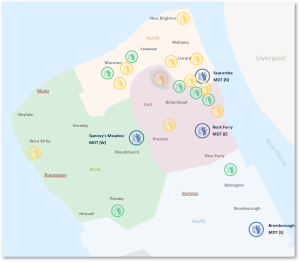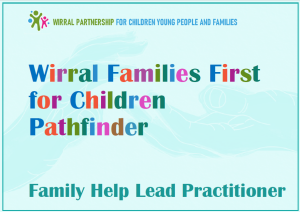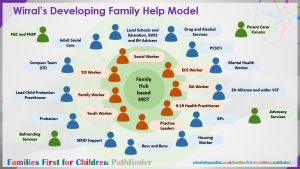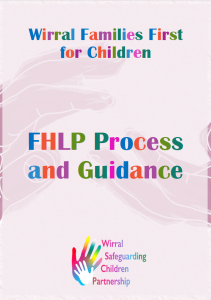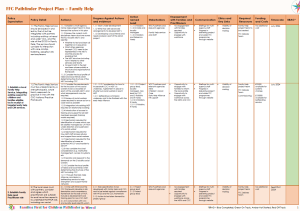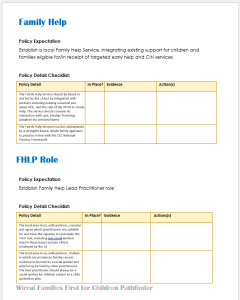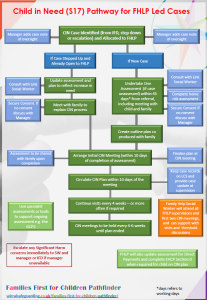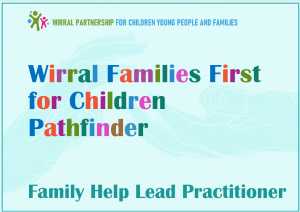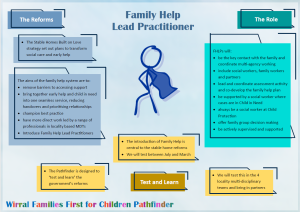FFC Family Help
Introduction
Families should be able to access the right help at the right time from the right people, so that they can overcome challenges, stay together and thrive. To achieve this, we will establish a targeted Family Help Service to support children and families with multiple needs who are eligible for or receiving Child in Need (CIN) or ‘targeted early help’ services. This approach will build on local best practice in early help in Wirral driven through programmes such as Supporting Families, Cradle to Career and the development of Family Hubs.
This new community-based service will bring together previously separate teams, who will work closely together to facilitate access to more effective help in the short to medium-term. This will help to address children and families’ needs before they escalate and avoids unhelpful handovers between practitioners.
Our Family Help Service will be accessible via an integrated ‘front door’ and be led by a core, LA-based family help team (FHT). Families will work with family help lead practitioners (FHLP) who will coordinate a bespoke team around the family (TAF). A Lead Practitioner, as set out in Working Together 2023, can be any practitioner most suited to building a lasting relationship with a family, including social workers and alternatively qualified practitioners.
Key Features
- Establish a multi-disciplinary family help team to provide seamless support for families, spanning targeted early help and child in need (section 17 of the Children Act 1989).
- Integrate family help within existing systems and services.
- Deliver an integrated ‘front door’ and service that is welcoming, effectively identifies families’ strengths and needs and decides on the appropriate lead practitioner for a family.
- Establish the Family Help Lead Practitioner (FHLP) role. This should be whoever is best placed to provide this role for the family and can include practitioners not employed by the LA.
- Establish clear thresholds and a single, family help assessment and plan for families.
- Establish proportionate plans for case management, oversight and supervision, considering increasing and decreasing needs over time.
The Approach in Wirral
The approach to developing an effective Family Help service was based on building upon our existing Family Hubs. Wirral had been an early adopter of family hubs and had developed locality based central and satellite hubs in a variety of settings across the Wirral, including previous Surestart centres, local schools and voluntary and community organisations. Four main hubs were chosen (due to size and location) were chosen to be the bases for the multi-disciplinary teams (MDTs) for Family Help.
Each of the four MDTs contained a team of predominately LA Early Help and Prevention staff who were already delivering a variety of services and single and multi-agency interventions in their local areas, including early childhood services, youth services, family matters and targeted family support, parenting support, domestic abuse, youth justice, mental health, and welfare and housing support. Staff in the MDTs were skilled and experienced in working across the continuum of need, assessing families, coordinating multi-agency support and leading interventions.
Activity undertaken through Pathfinder to develop Family Help in the MDTs:
- Each MDT has a locality operational lead, and each lead also manages one of the four main services (Family Matters, Early Childhood Services, Youth Services and Domestic Abuse). This arrangement helps ensure a consistency of offer and practice across Wirral. The locality leads report to a single head of family help
- Two social workers were co-located in each of the four MDTs. The eight social workers report to a single social care manager who works across the four areas supported by an advanced practitioner.
- As well as case holding the social workers provide support with cases to the MDT staff and are available for consultations and to undertake joint working with cases close to the Child in Need threshold, or cases being worked at CIN and led by an alternatively qualified practitioner. Social Workers can support with visits or attending supervision, or attending meetings with those staff
- The role of Family Help Lead Practitioner (FHLP) was created, and the role and responsibilities are set out in the document below. The role leads multi-agency interventions at Team Around the Family (TAF) and CIN. The role can be undertaken by an alternatively qualified practitioner or by a social worker (FHSW). Cases which escalate to Child Protection (CP) will always have a social worker leading.
- To support the role a comprehensive training programme is delivered through the WSCP, and a minimum standard of completion was set for staff undertaking the role of FHLP, including attendance at our Systemic Practice training which underpins our approach to working with children and families
- In year 1 of the Pathfinder alternatively qualified FHLPs have been drawn from existing LA staff in the MDTs. The next phase in year 2 will be to identify partners who are appropriate to assume the role
- Through the Pathfinder a number of commissions were made to support Family Help. These included: establishment of a befriending service delivered across a range of voluntary and community organisations and targeted at specific groups such as grandparents as carers, fathers, victims and survivors of domestic abuse etc; establishment of parental forums across Wirral; creation of a social work team based on the social worker in schools model. This supplemented an existing team and means we have a named social worker allocated to every high school in Wirral; creation of an additional Family Group Conferencing (FGC) team to provide capacity for facilitating family group decision making meetings across the continuum of need
- Co-production of a single assessment to replace the existing social care children and families assessment, and the early help assessment. The single assessment will be used for all cases at family help. Work has been undertaken with LiquidLogic to ensure cases which step up and down can smoothly move between the early help and social care modules
- Wirral’s developing Family Help model is illustrated in the graphic below:
Process and Guidance Document for FHLPs:
Summary Presentation
to be added
Experiences of Professionals
Feedback
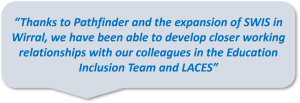
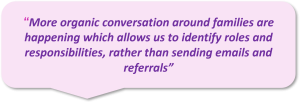
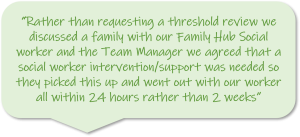
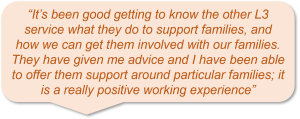
Things we found Helpful
- Early recruitment
- Early briefings and Q and A sessions for staff
- Establishing locality based multi-disciplinary teams including early help and prevention staff and social workers, and expanding our social workers in schools
- Co-producing the role of FHLP and the single assessment
- Engaging with and commissioning activity through the third sector
- Keeping our direction of travel and everything that works
Our Top Tips for Embedding the FFC Partnership Programme (Family Help)
- Identify resources to enable you to have your service delivery in localities, rather than centralised
- Use Family Hubs if you have them – they are already when known to families
- When created your MDT’s co-locate children’s social workers with your Early Help staff as early as you can
- Create a support process for FHLP’s who are not social workers to hold CIN cases (e.g. allocate an MDT social worker to support the case)
- Be realistic with your resources – for example, co location might need to be virtual
Local Resources
Project Action Plan – Family Help
Family Help Design Checklist
Job Roles
Pathfinder Roles – Wirral Safeguarding Children Partnership
Child in Need Pathway for FHLPs
Multi-agency Standards for Child in Need
FHLP Terms of Reference
National Resources
The families first partnership programme guide
Children’s social care national framework
An illustrated guide to the Children’s Social Care National Framework
Keeping children safe in education 2024
Inspecting local authority children’s services – GOV.UK
Return to FFC Homepage

